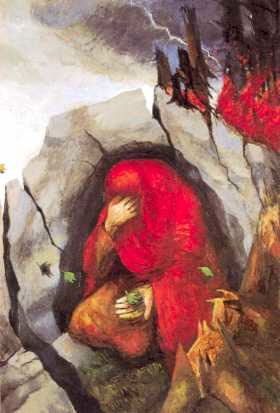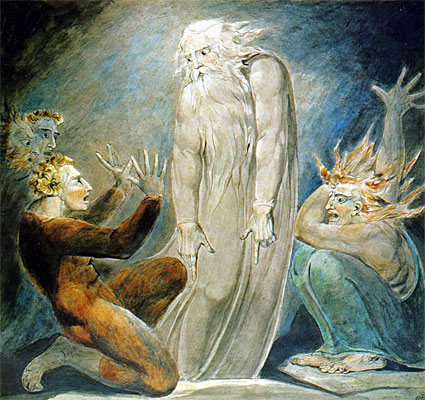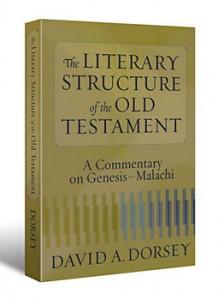Mar
16
2010

or Sinai Unspoken
On Mount Carmel, Elijah had built an altar of 12 rough-hewn stones. They substituted for the tribes of Israel. They were built and then consumed. The priests of Baal were slain and “washed” in the brook as atonement. The Land was clean. But we know Jezebel trampled this sacrifice underfoot. [1]
Elijah headed for the wilderness. He was a man with a mission. He went to the same cave in which Moses stood, a cleft in the rock. Once again, the Lord “passed over.” He was making a new Covenant, a new Creation, a new Heavens and a new Land.
Continue reading
Comments Off | tags: Azal, Cain, Elijah, Elisha, Ezekiel, Feasts, Hebrew, Jezebel, Tabernacle | posted in Biblical Theology, The Restoration Era
Dec
14
2009

“And when they shall say unto you, Seek unto them that have familiar spirits, and unto wizards that peep, and that mutter: should not a people seek unto their God? for the living to the dead?” Isaiah 8:19
I remember reading this verse for the first time in the KJV and wondering what it was exactly that the wizards were peeping at!
Continue reading
Comments Off | tags: Bible Matrix, Christmas, Feasts, Hebrew, Isaiah | posted in Biblical Theology
Nov
20
2009
Interesting stuff from James Jordan’s Trees and Thorns: A Commentary on Genesis 2-4

.
“…swarmers-creepers are described as creatures that break the boundaries of human life and invade the human house, defiling the house.”
The first two of the four curses upon the serpent are found in Genesis 3:14. Only the serpent is directly cursed, and the word You is emphatic in Hebrew. The man and the woman are not cursed directly, but mediately through the soil, an important distinction that we shall address in due course.
Continue reading
Comments Off | tags: Genesis, Hebrew, James Jordan, serpent | posted in Biblical Theology, Quotes
Apr
15
2009
 “I began writing this book some ten years ago, although my interest in Hebrew literary structure goes back a decade before that. My fascination with the subject was kindled when I began teaching Old Testament courses in seminary. At that time I was struck by the apparent lack of order within many of the biblical books. Jeremiah seemed hopelessly confused in its organisation; so did Isaiah and Hosea and most of the prophets. Song of Songs and Ecclesiastes appeared to be in almost complete disarray, and even the more orderly historical books, such as Joshua and Kings, showed signs of strangely careless organisation. Why did the biblical authors write like this? I would never write a book, an article, or even a private letter with such carelessness of arrangement.
“I began writing this book some ten years ago, although my interest in Hebrew literary structure goes back a decade before that. My fascination with the subject was kindled when I began teaching Old Testament courses in seminary. At that time I was struck by the apparent lack of order within many of the biblical books. Jeremiah seemed hopelessly confused in its organisation; so did Isaiah and Hosea and most of the prophets. Song of Songs and Ecclesiastes appeared to be in almost complete disarray, and even the more orderly historical books, such as Joshua and Kings, showed signs of strangely careless organisation. Why did the biblical authors write like this? I would never write a book, an article, or even a private letter with such carelessness of arrangement.
I was intrigued by the possibility that the Hebrew authors might have organised their compositions according to literary conventions that were different from ours. I began to discover, over a period of years, that several structuring patterns rarely used by us were remarkably common in the books of the Hebrew Bible, particularly chiasmus (symmetry), parallelism, and sevenfold patterns. I was increasingly struck by how often these patterns had been utilised to arrange biblical books…
It was my mother who gave me a love for literature. She read to my brother Stephen and me regularly, from as early as I can remember. I still have many fond memories of those wondrous bedtime stories, whose structures — like the Bible — were designed for the ear, not the eye.”
David A. Dorsey, The Literary Structure of the Old Testament, p.9-10 (Preface).
Comments Off | tags: Chiasm, David A. Dorsey, Ecclesiastes, Hebrew, Isaiah, Jeremiah, Literary Structure, Old Testament, Song of Songs | posted in Quotes
Apr
13
2009
And He said to me, “Son of man, stand on your feet, and I will speak to you.” Then the Spirit entered me when He spoke to me, and set me on my feet; and I heard Him who spoke to me. And He said to me: “Son of man, I am sending you to the children of Israel, to a rebellious nation that has rebelled against Me; they and their fathers have transgressed against Me to this very day. (Ezekiel 2:1-3)
I started Hebrew lessons this week. We’ll see how long I last! Anyhow, my teacher made a comment about Ezekiel 2:1. Apparently, the phrase translated “I will speak to you” is actually a gloss. Literally, it says, I will speak you. The Lord gives Ezekiel a scroll to eat and sends him as son of man against Jerusalem.
So, as son of man, Ezekiel is the living, walking WORD. He is the Law written on tablets of flesh.
Comments Off | tags: Exile, Ezekiel, Hebrew, Translation | posted in Biblical Theology





























